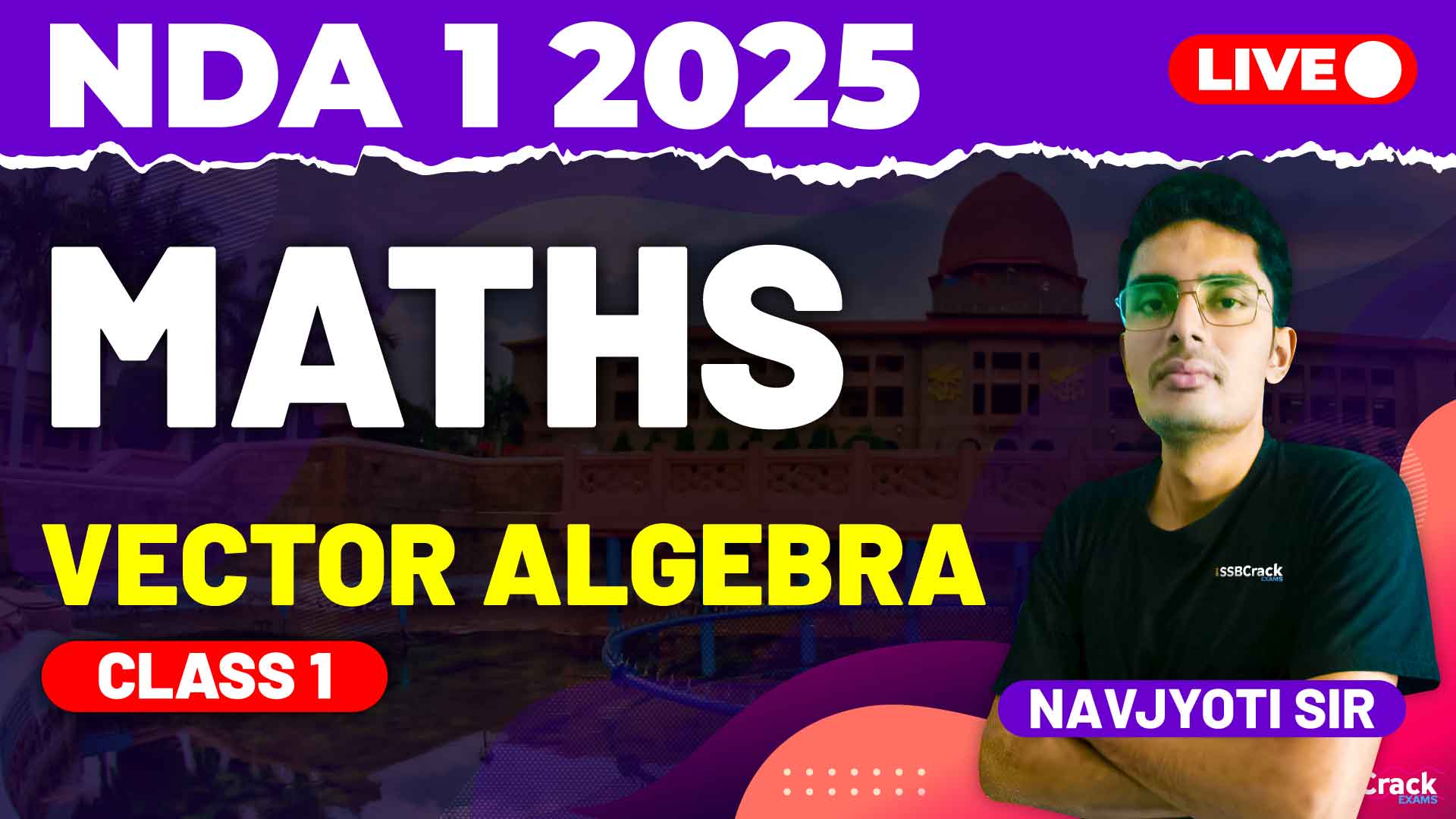In preparation for the National Defence Academy and Naval Academy (NDA-NA) Exam—Paper I (Maths), a recent class on Vector Algebra provided a comprehensive overview of key sub-topics like vectors, types of vectors, position vectors, unit vectors, components, vector addition, subtraction, and the various types of vector multiplication. This foundational topic is essential in the NDA-NA syllabus, testing a candidate’s ability to visualize and operate within multi-dimensional spaces, a crucial skill for real-world applications in physics and engineering.
Key Topics Covered in the Class
The class took an in-depth look at all essential aspects of Vector Algebra, starting from the basics and progressing to more complex operations. Here’s a breakdown of what was covered:
1. Introduction to Vectors
- Definition and Position Vectors: A vector, as explained, is an entity that has both magnitude and direction, unlike a scalar which only has magnitude. Students were introduced to the concept of position vectors, which locate points in space relative to a fixed origin.
- Types of Vectors: Various types of vectors were discussed, such as zero vectors, unit vectors, and equal vectors. Knowing the types and properties of vectors is critical in understanding how they interact with each other in different operations.
2. Unit Vectors and Components of a Vector
- Unit Vectors: Defined as vectors with a magnitude of one, unit vectors serve as the fundamental building blocks for directional understanding in vector algebra.
- Components of a Vector: The class delved into expressing a vector in terms of its horizontal and vertical components. This is particularly useful in problems involving two-dimensional or three-dimensional space.
Understanding unit vectors and components is crucial since they make it easier to visualize vectors in space and perform vector operations efficiently.
3. Vector Addition and Subtraction
- Triangle and Parallelogram Law: The triangle and parallelogram laws were explored for adding vectors, which form the foundation for combining forces, directions, or movements represented by vectors.
- Subtraction of Vectors: Vector subtraction was also covered, helping students understand how to determine the relative displacement between two points or objects.
The laws of vector addition and subtraction form the basis of vector operations and have practical applications in physics problems, which are often a part of NDA-NA exams.
4. Vector Multiplication
- Scalar (Dot) Product: This product results in a scalar quantity and is widely used to measure the projection of one vector onto another.
- Vector (Cross) Product: This product produces a vector that is perpendicular to the plane containing the two vectors being multiplied, with applications in finding areas and understanding perpendicular directions.
Vector multiplication, whether scalar or vector, is integral to understanding physical concepts such as force, work, and torque, making it a key concept for NDA-NA candidates to grasp thoroughly.
Strategies for Effective Preparation of Vector Algebra for the NDA-NA Exam
- Understand the Basics Thoroughly: The foundation of vector algebra lies in understanding the types of vectors and their representations. Ensure you have a clear understanding of different vector types and how they function in various scenarios.
- Practice Component Breakdown: In vector problems, breaking down vectors into their components makes calculations easier. Consistently practice representing vectors as components and using unit vectors, as this approach simplifies complex problems.
- Master Vector Addition and Subtraction Laws: The triangle and parallelogram laws are fundamental for vector addition and subtraction. Practice a variety of problems involving these laws to gain confidence, as they often form the basis for questions involving displacement or resultant vectors.
- Focus on Multiplication Techniques: The dot and cross products are frequently tested concepts. Practice identifying when to use each type, as dot products apply to finding projections or work done, while cross products apply to area-related questions. Mastering these will improve your ability to interpret the exam questions accurately.
- Use Diagrams for Visualization: Vector algebra can often be confusing without visual aids. Drawing diagrams can greatly help in understanding direction, magnitude, and the relationship between vectors, particularly for addition, subtraction, and cross product operations.
- Apply Concepts to Real-Life Scenarios: Applying vector algebra to real-life problems, such as forces acting on an object, helps solidify your understanding. The NDA-NA exam may include situational questions that apply vector concepts, so practicing with real-world examples will enhance both understanding and retention.
- Practice MCQs and Past Papers: Solving past years’ MCQs and expected questions allows you to identify the patterns in which vector questions are asked. Pay attention to commonly tested areas like position vectors, unit vectors, and vector multiplication, as these often appear in exams. Practicing under timed conditions will also improve your speed and accuracy.
Conclusion
Vector Algebra is a powerful tool in the NDA-NA Maths syllabus, opening doors to a deeper understanding of three-dimensional space and real-world applications. The recent class provided an extensive discussion on essential concepts through MCQs, enabling students to practice and improve their problem-solving abilities in this critical topic.
By following a structured approach that includes understanding the basics, visualizing vectors, mastering operations, and practicing consistently, candidates can solidify their command over Vector Algebra. Ultimately, this knowledge not only helps secure higher marks in the NDA-NA exam but also lays a foundation for applications in physics, engineering, and defense tasks. With focused preparation and effective problem-solving techniques, mastering Vector Algebra becomes a manageable and rewarding goal for NDA-NA aspirants.







